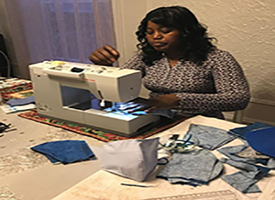Disaster Recovery Support Initiative launches

Rachel Larratt, Long-Term Recovery Group Formation Advisor, Disaster Recovery Support Initiative.
When a natural or technological disaster strikes a community, beginning the process of long-term recovery quickly is essential. Yet, it can be a daunting task for local leaders who may not have experience in disaster recovery and may have suffered damage and loss themselves.
Community-based long-term disaster recovery groups (LTRGs) focus on the unmet needs of disaster survivors beyond what they can handle out of their own resources and/or with FEMA and other governmental assistance. LTRG functions include case management, volunteer coordination and hospitality, and construction management. It is not unusual for it to take six months or more to get long-term recovery up and running. Time can be the enemy – frustration increases, public interest decreases, and resources go toward temporary assistance instead of long-term solutions.
The ecumenical Disaster Recovery Support Initiative (DRSI) is working to help communities shorten the time between the immediate disaster response and long-term recovery by encouraging, modeling, mentoring, and supporting the development of local long-term recovery groups through the sustained on-site presence of a Disaster Recovery Support Team (DRST).
DRSI is a joint endeavor of the disaster ministries of the United Church of Christ, Christian Church (Disciples of Christ) and Church of the Brethren. All three are members of National VOAD – Voluntary Organizations Active in Disaster.
The initiative builds on the three partners’ year-long collaboration in Columbia, S.C., where they responded to the destructive flooding that occurred in October 2015. By December 2015, denominational long-term disaster recovery volunteers were on the ground. “We helped a long-term recovery group get started there and did construction and volunteer management, helping more than a dozen households recover early,” said UCC Disaster Ministries Executive Zach Wolgemuth.

Tim Sheaffer, Construction Management Advisor, Disaster Recovery Support Initiative.
In the coming year, the DRSI will seek to build on what partners learned in South Carolina, to help communities access, leverage and account for resources. Disaster Recovery Support Teams will stay with the community for 2-6 months, as needed, to resource the local recovery effort, offering training, mentoring and assistance. In disasters where unmet construction needs exist, the team may help recruit work teams to begin repairs in an effort to expedite recovery and model long-term recovery in collaboration with local leadership.
“By living in community and walking alongside local recovery leaders, the Disaster Recovery Support Team will assist with a smoother, quicker transition from response to recovery,” offered Josh Baird, Director for Disciples Volunteering with the Christian Church (Disciples of Christ).
Jenn Dorsch of Brethren Disaster Ministries added, “As local leaders make decisions about the recovery efforts in their communities, the DRSI will provide consistent one-on-one support.”
The Disaster Recovery Support Initiative has hired two staff to guide this next phase in the project’s development:
Rachel Larratt, Long-Term Recovery Group Formation Advisor. Rachel led recovery efforts in Columbia, S.C. Her experience includes serving as the Chair of an LTRG, forming and running her own community relief foundation, and, as a flood-affected individual, navigating her own recovery process.
Tim Sheaffer, Construction Management Advisor. Tim is a long-term Brethren Disaster Ministries volunteer who has served in recovering communities for eight years leading rebuild sites and working with local partners. He most recently assisted ecumenical recovery support in Columbia, S.C., and helped UCC Disaster Ministries and Brethren Disaster Ministries assess next steps in West Virginia.
“When early recovery happens, everyone benefits,” Wolgemuth said. “Leveraging funds early allows families to return home faster. Documented early success allows LTRGs to receive grants, new partners, additional funding, and more volunteers. And engaging volunteers when passion and energy levels are high increases the likelihood for repeat support.”
DRSI contacts:
Rachel Larratt, Long-Term Recovery Group Formation Advisor – rachel@DRSIteam.org
Tim Sheaffer, Construction Management Advisor – tim@DRSIteam.org
Josh Baird, Director, Disciples Volunteering, Christian Church (Disciples of Christ) – jbaird@dhm.disciples.org
Caroline Hamilton Arnold, Associate Director, Week of Compassion, Christian Church (Disciples of Christ) – caroline@weekofcompassion.org
Jenn Dorsch, Director, Brethren Disaster Ministries, Church of the Brethren – jdorsch@brethren.org
Zach Wolgemuth, Executive, Disaster Ministries, United Church of Christ – wolgemuthz@ucc.org
Related News
When Life Gives You Scraps
“It’s so good making masks because it helps the community,” said Sandra, a Congolese refugee...
Read MoreSome recent UCC Disaster MInistries international grants
Here are some recent international grants approved by UCC Disaster Ministries: $20,000 to Global...
Read MoreDisaster recovery initiative is growing ecumenically
A pilot program to help communities launch long-term recovery following disasters is growing...
Read More